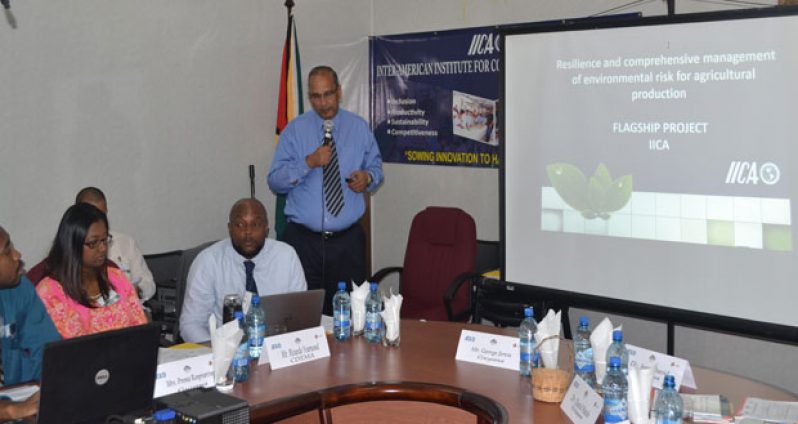THE Inter-American Institute for Cooperation on Agriculture (IICA) last Tuesday launched a three-year project which aims at increasing resilience and comprehensive management of the environmental risks of agricultural production within Guyana and six other countries within the Region.
The venue was the Boardroom of the Ministry of Agriculture, Regent Street, Georgetown.
The project is in keeping with IICA’s role as the institution of the Inter-American system that provides technical cooperation, innovation and specialized knowledge for the competitive and sustainable development of agriculture in the Americas and the Caribbean.
It also aims to achieve the consequent improvement of the lives of small farmers and rural dwellers.
Disclosing details, project leader Dr Muhammad Ibrahim, who hails from Guyana, explained that for IICA resilience in the context of agricultural production is the capacity of agricultural development to withstand or recover from stresses and shocks such as storms, floods and drought and even indebtedness and bounce back to the previous level of growth.
FLAGSHIP PROJECT
He said that the context of the IICA project, which he described as a flagship project, is the increase in risks to sustainable agriculture coupled to the institutional weaknesses of many CARICOM countries to prevent, mitigate or respond to these risks in a comprehensive way.
The objective of the three-year project is to enable participating states to anticipate, prepare and respond to environmental risks that may affect agricultural production (and consequently the welfare of farmers and rural inhabitants) through innovation and risk management using principles of sustainable adaptation.
He said: “The Caribbean region has challenges for food production. The food import bill is very high. We need to have sustainable intensification of agriculture for increased productivity while at the same time protecting the environment and improving livelihoods and rural prosperity.”
The ultimate goal is agriculture that sustainably increases productivity, enhances resilience, reduces or removes greenhouse gases and enhances achievement of national food security and development goals, Dr. Ibrahim said.
The participating countries are Guyana, Suriname, Jamaica, Trinidad and Tobago and the three eastern Caribbean states of St. Lucia, Grenada and St Vincent and the Grenadines, each of which had indicated interest and requested support.
Dr. Ibrahim said that the IICA project will be executed through four areas, namely: comprehensive management of production systems resilient to climate change, comprehensive management of environmental risks for production, comprehensive management of sanitary and phyto-sanitary risks for resilient agriculture and efficient use of water and sustainable land management with a similar aim.
The project will look at growth and resilience from the point of view of resilient agriculture utilizing climate smart agricultural practices, resilient markets to reduce price volatility attract investments and build enabling environments and resilient people with focus on scaling up nutrition and involvement of rural women and youth.
Dr. Ibrahim disclosed that component two in particular, namely comprehensive management of environmental risks for production, will specifically address the issue of agricultural insurance as a risk management strategy.
AGRICULTURAL INSURANCE
The aim is the eventual creation and development of agricultural insurance schemes for participating countries as an aspect of agricultural risk management. He said that the resilience project will have at least three actions which are cross-cutting in each of the components, namely knowledge management, capacity building and policy development and harmonisation.
Dr. Ibrahim added that the project will be grounded by inserting cooperation with the Caribbean Disaster Emergency Management Agency (CDEMA), the Food and Agricultural Organisation (FAO), the Caribbean Agricultural Development Institute (CARDI) and other development organisations working in the region.
He said, “IICA is not going to come in and reinvent the wheel but will build on existing platforms, projects and programmes.”
The project is to be executed through the IICA offices in the participating countries which will work in collaboration with local stakeholders with coordination and support from the IICA Head Office in Costa Rica.



.jpg)








